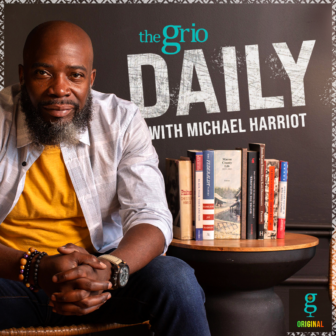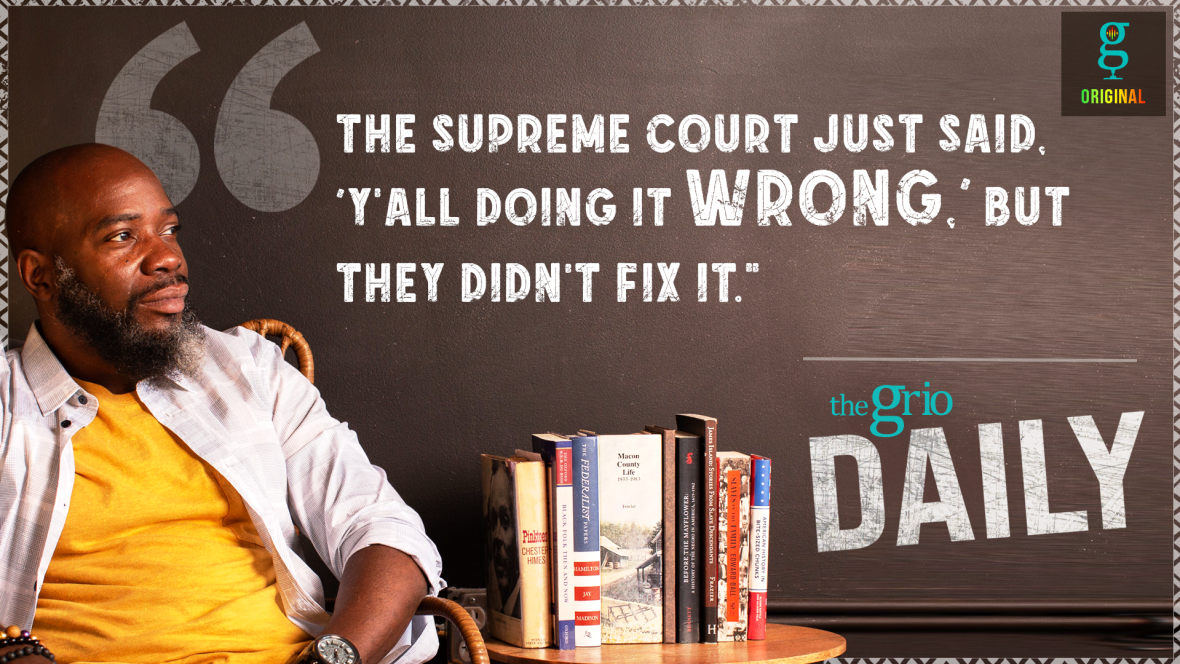
“The Supreme Court just said, y’all doing it wrong but they didn’t fix it.” It’s been 69 years since The Supreme Court ruled in Brown v. Board of Education of Topeka deciding that racial segregation in public schools was unconstitutional. The decision is considered a cornerstone of the civil rights movement but was it really justice? Michael Harriot shares history about the landmark decision you’ve likely never heard and explains that while it was significant it didn’t go far enough.

Read Full Transcript Below:
[00:00:00] You are now listening to theGrio’s Black podcast network. Black Culture Amplified.
Michael Harriot [00:00:05] You know what this week is? Why I like This week is one of the most significant parts of American history when the Supreme Court desegregated schools. Well, not really, But this is the anniversary of Brown versus Board of Education. And that’s why I want to welcome you to theGrio Daily, the only podcast that will tell you the real story of Brown versus Board. When we talk about the anniversary of Brown versus Board of Education, you know, the full title of that case is Brown versus the Topeka, Kansas Board of Education. But it wasn’t really about Topeka, Kansas. It didn’t begin in Topeka, Kansas. It began before 1954, before the Brown versus Board decision. It began in South Carolina, in a little town called Summerton. And then so much in South Carolina, it was 75% Black. And the Black population really wasn’t that poor. First of all, you have to remember that until like 1940s, South Carolina was majority Black since its inception. Right. And so in Summerton, which was 75% Black, there were two basically two different school systems. It was one school district, the Clarendon County Board of Education. But there were two separate but equal school systems according to the law. Right. But they were not really equal. Right. So with 75% Black people and the Black population was not poor, there was a paper factory near Summerton.
Michael Harriot [00:01:47] So the Black people were employed, so they paid more taxes than the white population. Their property taxes actually funded the schools, but the white people went to a nice, beautiful school. And the Black people, the children, some of them had to cross a river. Some of them had to walk up to nine miles a day. Some of them drowned on the way to school when the river was really high and their parents said “Man, enough of this,” because when they got to school, they like had to chop wood, put it in a heater to heat up the classrooms. The white people had, of course, nice heaters. The Black parents were mad. They knew it was an equal, but they only asked for one school bus like they started from the bottom. Right. They said, Let’s just start with some of our kids not drowning on the way to school, some of our kids not having to walk nine miles to get to school. Let’s go with that. So they asked the Clarendon County School Board, which was again funded by the Black people, one of the 33 busses that was dedicated for the white students. Black people had zero. The white people had 33 busses. And the school superintendent said no. And the Black was like, “What?” They asked the NAACP to give them a lawyer, and the NAACP said, Hey, we will send this young lawyer and maybe he’ll represent you. And so they filed a case and that case was dismissed. At first, the reason it was dismissed was because the South Carolina Circuit Court said, Look, the guy who is suing has no standing now, standing as a legal principle. That said, you have to have something invested in the case, like I can’t sue somebody who did something for you because I don’t have standing in the argument.
Michael Harriot [00:03:35] And so the Supreme Court of South Carolina said, you don’t have standing. The reason he said he didn’t have standing was what Clarendon County did when the Black parents filed the lawsuit was say, look, all Black people who own land, especially this guy who’s filing this lawsuit, you don’t have to pay those property taxes anymore. Right. Because if you own property on the county line, you just pay your taxes to the next county and the county, one county over, they’ll send us what you owe. And what does that matter? Because that meant that South Carolina or Clarendon County specifically wasn’t stealing the Black people’s money. They were just administering this separate but equal policy. Right. So when the court decided to strike down the case, all of the Black parents sue again. And that case is what became one of five cases, one in Kansas, one Virginia, one in South Carolina. They became five cases that became Brown versus Board of Education because so many states were basically stealing Black people’s money, stealing Black people’s taxes and giving it to white people. That Supreme Court said, why not just hear all these cases at once? And that’s how Brown versus Board of Education came before the Supreme Court.
Michael Harriot [00:05:03] Now, here’s the importance of what Brown versus Board of Education said was like separate ten, not be equal. By the fact that is separate, it ain’t equal. Theny why you separating them, right. Like two separate two things you must believe. Like what is different? One is lesser what is somehow inherently entitled to something different than the other person. Separate cannot be equal. Does segregation or the separate but equal doctrine was struck down. Well, not really. See more schools in South Carolina in separate for another 10-20 years. In the seventies is really when the state started desegregating in most states across the country because white people put up a big fuss. In Virginia, they had what they call massive resistance. They just said no. In states all across the country they unenrolled that is out of public schools and started what we call segregation academies, all white schools sponsored by churches and private groups. And if you want to know why there are so many private schools in the South, this is why Brown versus Board. But one of the things that Brown versus Board didn’t into. Right. Let’s go back to Clarendon county. That whole time from the beginning when Black people created America’s public education system in 1868. Until 1950, when those people sued, until the decision of Brown versus Board of Education were Brown versus Board of Education said, Is all this stuff you were doing all of that time was wrong.
Michael Harriot [00:06:45] Now, let me ask you this. What kind of crime can you commit? Can you steal something from somebody? Can you take something from somebody? But you don’t pay some kind of restitution? You don’t make the personal. So by desegregating schools, they still didn’t make Black people whole. Because white people had already stole the money. They had already, for 100 years built the society that benefited white people. In South Carolina, there were seven public universities, zero for Black people. Right. And so, in a sense, what the Supreme Court did was just say, y’all doing it wrong. But they didn’t fix it. Because if somebody steals your money and I take them to the police or the court and the police say, yeah, he stole your money, but don’t make them give my money back, that ain’t justice. It’s just a thing that they said. And that’s why a lot of people believe, including myself, that reparations shouldn’t be just for slavery. It should be for all of that money that they stole from us to give to white people doing segregation, all of the money, all the tax dollars that they stole for the G.I. Bill, that Black people couldn’t get all of the money that they stole during redlining, all of the money that they stole for unequal real estate practices. All of that stolen money is separate from slavery, but it is the vestiges of slavery. And if you are Black in America, you were subject to that theft.
[00:08:18] That’s why will the anniversary of Brown versus Board, we shouldn’t just think of it as justice because there was no justice done. Justice will never be done until they pay us back. They give us what we owe. They give us the money that they stole from all of the Black people in America. Ed, until you download the Grio app, you tell a friend about this podcast and you subscribe on whatever platform you listen to this podcast. And Brown versus Board is one of the reasons that we will always leave you with the Black saying. And today’s Black saying is “Separate ain’t equal, but America ain’t either.” We’ll see you next time on theGrio Day. If you like what you heard, please give us a five star review. Download theGrio app, subscribe to the show and to share it with everyone you know. Please email all questions, suggestions and compliments to podcast at theGrio dot com.
Toure [00:09:26] The eighties gave us unforgettable songs from Bob Marley, De La Soul and Public Enemy.
Public Enemy [00:09:32] All the special situations. Unreal. I got a raw deal.
Toure [00:09:35] Being Black in the Eighties is a podcast docu series hosted by me, Touré, looking at the most important issues of the eighties through the lens of the decade songs. A decade when crack kingpins controlled the streets but lost their humanity.
[00:09:55] You can’t be like no soft smile and happy go lucky drug dealer, and you have to suppress that.
Toure [00:10:02] It was a time when disco was part of gay liberation.
[00:10:05] It provided the information to counter narratives that were given to gay people by the straight world.
Touré [00:10:12] This is the funkiest history class you’ll ever take. Join me, Touré, for Being Black in the eighties on theGrio Black Podcast Network or wherever you listen to podcasts. Available June 1st.